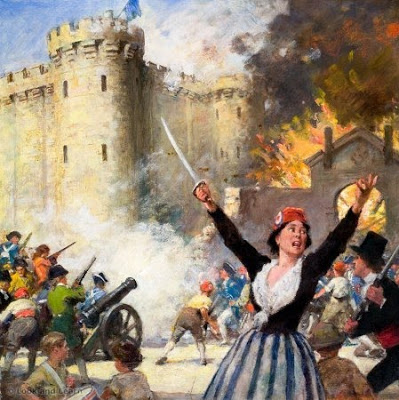 The storming of the Bastille, 14 July 1789.
The storming of the Bastille, 14 July 1789.Where Did the Tea-Party Anger Come From?
The ORIGINAL gathering place for a merry band of Three Percenters. (As denounced by Bill Clinton on CNN!)
When the Supreme Court extended the individual right to own a gun Monday, it handed Second Amendment advocates — many of whom are at home in the GOP — one of their most significant legal victories ever.
But who won the day in politics? The Democrats.
For them, the court’s groundbreaking decision couldn’t have been more beneficial to the cause in November. Now, Democratic candidates across the map figure they have one less issue to worry about on the campaign trail. And they won’t have to defend Republican attacks over gun rights and an angry, energized base of gun owners.
“It removes guns as a political issue because everyone now agrees that the Second Amendment is an individual right, and everybody agrees that it’s subject to regulation,” said Lanae Erickson, deputy director of the culture program at centrist think tank Third Way.
A House Democratic aide agreed that the court’s decision removed a potentially combustible element from the mix.
“The Supreme Court ruled here that you have a fundamental right to own and bear arms, and that means at the national level it’s harder — whether it’s Republicans or whether it’s the [National Rifle Association] — to throw that claim out: If Democrats are in charge. they’re going to come get your guns,” said the aide. “It pretty much took that off the table.”
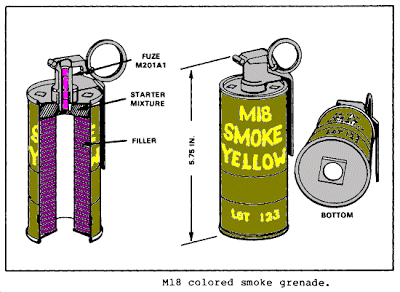
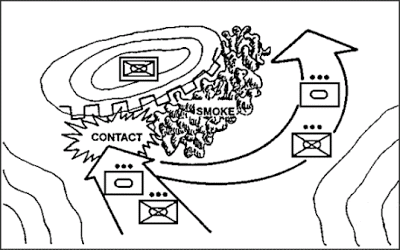
1 - U.S. Mil-Spec Triple Action WHITE Smoke Grenade
[ALSG973] $49.95
This is a U.S. Mil-Spec. Triple Action White smoke Grenade. These smoke grenades are manufactured by A.L.S. Technologies, and are currently being used by our military in Iraq. The Tri-Action, White Smoke Grenade is a hand thrown device that releases three separate sub-munitions on discharge. The sub-munitions will separate between 15' and 20' apart, giving a wide coverage area per sub-munition. The ALS G973 is extremely effective in creating diversions for tactical operations.The Triple Action White Smoke Grenade delivers a cloud of white Smoke for approximately 30 seconds per sub-munition. These Grenades are used for training and screening purposes and are also very effective in creating a diversion for certain tactical operations. These smoke grenades are great for the paintball field when a wide range of cover is needed. These smoke grenades require the user to be able to throw them high enough for it to separate in the air. If the smoke grenade hits the ground before it separates it may not work properly. This is not something that is hard to do, you just have to throw them high and away from you.
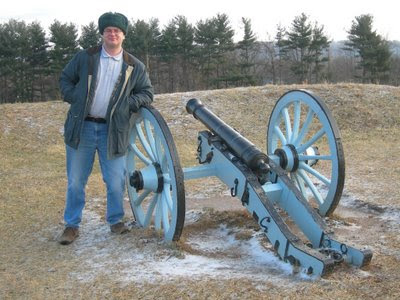 Herr General Arschlecker, aka Sebastian Snowflake, chief NRA Internet Apologist and Judenraten.
Herr General Arschlecker, aka Sebastian Snowflake, chief NRA Internet Apologist and Judenraten.Judenräte (singular Judenrat; German for "Jewish council") were administrative bodies that the Germans required Jews to form in the German occupied territory of Poland, and later in the occupied territories of the Soviet Union.
The first Judenräte were formed by Reinhard Heydrich's orders on September 21, 1939, soon after the end of the German assault on Poland.
The Judenrat served as a liaison between the German occupying authorities and the Jewish communities under occupation. The Judenrat operated pre-existing Jewish communal properties such as hospitals, soup kitchens, day care centers, and vocational schools.
With the formation of ghettos, these bodies became responsible for local government in the ghetto, and stood between the Nazis and the ghetto population. They were generally composed of leaders of the pre-war Jewish community (with the exception of the Soviet Union, where Jewish organizations were eliminated in 1930s). They were forced by the Nazis to provide Jews for use as slave labor, and to assist in the deportation of Jews to extermination camps during the Holocaust. Those who refused to follow Nazi orders or were unable to cooperate fully were frequently rounded up and shot or deported to the extermination camps themselves.
In a number of cases, such as the Minsk ghetto and the Łachwa ghetto, Judenrats cooperated with the resistance movement. In other cases, Judenrats collaborated with the Nazis, on the basis that cooperation might save the lives of the ghetto inhabitants. -- Wikipedia.
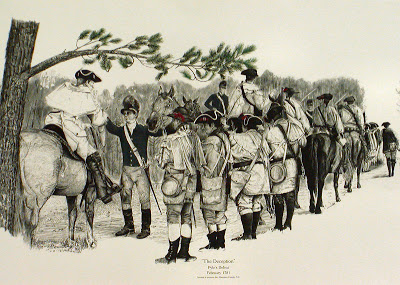 The deception which opened the way for Light Horse Harry Lee and "Pyle's Hacking Match."
The deception which opened the way for Light Horse Harry Lee and "Pyle's Hacking Match."Pyle's Massacre, also known as Pyle's Hacking Match, was a battle that took place during the American Revolutionary War in Orange County, North Carolina (present-day Alamance County, North Carolina), on February 24, 1781, between Patriot and Loyalist North Carolina militia troops.
Background
Dr. John Pyle, Sr., a native of Chatham County, had previously fought against the colonial government in the War of the Regulation but did not serve at the Battle of Alamance. After the battle, however, Pyle responded to General Charles Cornwallis' call for Loyalists in the Revolution, and he served in the militia against the American Patriots as a colonel. After being captured, Dr. Pyle took an oath of loyalty to the Provincial Congress. However, with General Cornwallis' army encamped at nearby Hillsborough, Dr. Pyle gathered between 300 and 400 troops and sent a request to Cornwallis for an escort. Cornwallis sent Banastre Tarleton with his cavalry and a small band of infantry to escort these men.
At the same time, Lieutenant Colonel Henry "Light Horse Harry" Lee—father of Robert E. Lee—and Brigadier General Andrew Pickens were in the area with orders to harass the enemy. They had sent out scouts to locate Pyle's army. Upon learning of their location, they made plans to rendezvous with those forces with the objective of attacking Tarleton's dragoons and infantry, which would deal a major blow to Cornwallis.
At noon on February 24, Lee and Pickens captured 2 British staff officers and learned through interrogation that Tarleton was only a few miles ahead. In the waning hours of the day, Lee's Legion, who wore short green jackets and plumed helmets, encountered 2 of Pyle's men, who mistook them for Tarleton's dragoons who wore similar uniforms. Lee used this confusion to his advantage and learned that Pyle's army was located nearby. Lee's troops trotted into the camp in full salute. Lee exchanged customary civilities with Colonel Pyle and began shaking his hand when the sounds of battle commenced.
Battle
The most commonly accepted account of the battle, pieced together from reports from Lee and Captain Joseph Graham, indicates that Lee's deception was purely chance, and that he had originally intended to avoid the Loyalists, intending instead to encounter Tarleton's Dragoons, the more important objective. The sounds of battle apparently commenced when the militia at the rear of Lee's Legion, recognizing the strips of red cloth on the hats of Pyle's men as the badge of Loyalists, alerted Captain Eggleston, who was new to the South and was not familiar with local Whig and Tory badges. When he asked one of the Loyalists which side he was on, the man replied "King George," and Eggleston responded by striking him on the head with his sabre. Seeing this, the militia joined in the attack. The Loyalists, believing the attack to be a mistake, continued insisting they were on King George's side, to no avail. After 10 minutes, the remaining Loyalists had fled, and ninety-three Loyalists were known to be dead, certainly more were wounded and others were seen being carried off by friends. According to local legend, John Pyle was badly wounded in the battle and crawled into a nearby pond where he concealed himself until he could be rescued. After recovering from his wounds, he surrendered to the local militia. Later they were pardoned as a result of Pyle's care for wounded patriots.
Aftermath
Lee's and Pickens' ultimate goal of encountering Tarleton was foiled when Tarleton received orders on the night of February 24 ordering him to return to rejoin the main army. Though pursued, Tarleton eventually got too close to the main British army for Pickens and Lee to attack safely.
The British were quick to denounce the massacre. Cornwallis, in a letter to Lord George Germain, reported that most of Pyle's force were "inhumanly butchered, when begging for quarters, without making the least resistance."
The battle occurred a few weeks before the Battle of Guilford Courthouse and was a contributing factor in weakening British troop numbers and morale as that battle approached.
As late as 1850, local residents could point out the location of the battle and of the mass graves of those killed during the skirmish; at least one alleged known mass grave has been recently relocated. The site is marked with periwinkle and cedar trees and at one time had a stone marker (placed in 1880), which has since been removed from the site; the marker's current location is unknown.
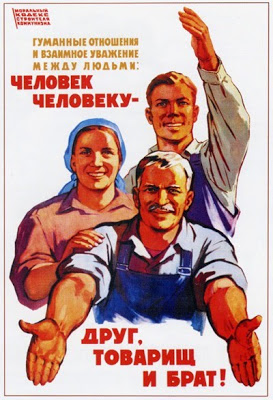 The Bolsheviks believed in the perfectibility of man. They called their ideal "The New Soviet Man."
The Bolsheviks believed in the perfectibility of man. They called their ideal "The New Soviet Man."Man will make it his purpose to master his own feelings, to raise his instincts to the heights of consciousness, to make them transparent, to extend the wires of his will into hidden recesses, and thereby to raise himself to a new plane, to create a higher social biologic type, or, if you please, a superman. -- Leon Trotsky, Literature and Revolution, on "the New Soviet Man."
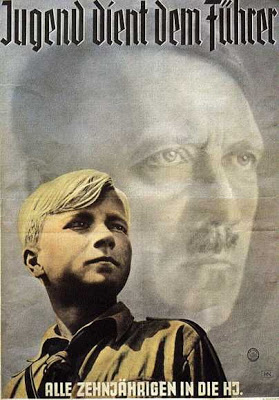 The Nazis believed in the "purification of the race." Their model was the Aryan warrior. Their version of "The New Soviet Man" was the
The Nazis believed in the "purification of the race." Their model was the Aryan warrior. Their version of "The New Soviet Man" was the Blood mixture and the result drop in the racial level is the sole cause of the dying out of old cultures; for men do not perish as a result of lost wars, but by the loss of that force of resistance which is continued only in pure blood. All who are not of good race in this world are chaff. -- Adolf Hitler, Mein Kampf
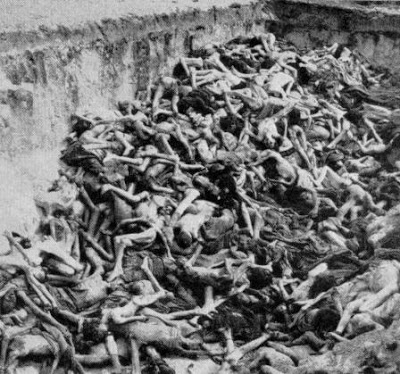 The natural by-products of collectivist "perfectibility" and "purification."
The natural by-products of collectivist "perfectibility" and "purification." Bolt from the blue: Seen from the Hancock Tower, lighting strikes both the Willis Tower, right, and the Trump Tower in downtown Chicago as a severe storm rolls through the region last night
Bolt from the blue: Seen from the Hancock Tower, lighting strikes both the Willis Tower, right, and the Trump Tower in downtown Chicago as a severe storm rolls through the region last night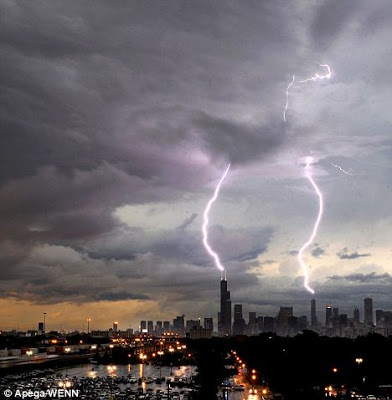
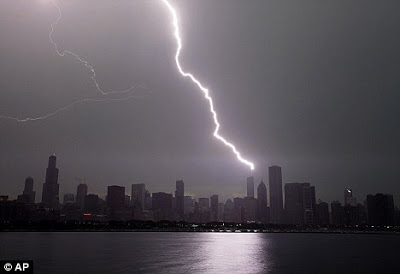
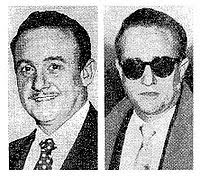 Journalist Victor Riesel, before and after his blinding in an acid attack by union mob goons.
Journalist Victor Riesel, before and after his blinding in an acid attack by union mob goons.When Victor was three years old, his father taught him to make pro-union speeches and would take his son to rallies and union meetings and have the boy recite the speeches for onlookers. Attending union meetings, indoor and outdoor rallies, and standing on street corners promoting the union formed many of Victor Riesel's childhood and teenage memories. In the 1920s and 1930s, Nathan Riesel successfully opposed Communist Party USA attempts to infiltrate activists into the local union and turning its purpose to promotion of the party (a strategy known as "boring from within"). Throughout his childhood and teenage years, he saw his father come home bleeding many times after fistfights with communist activists or gangsters. This conflict left a deep impression on Victor. . .
Two additional events in Riesel's life led him to a career as a labor reporter. The first occurred in March 6, 1930, during a visit to his father's union offices. Riesel saw a man weeping on the stairs because he had no job and his famiy had no food to eat. The second occurred in 1942. Nathan Riesel was now fighting organized crime influence in his union, and despaired of keeping his local out of criminal hands. Nathan Riesel was very badly beaten by gangsters in 1942, and died five years later (in part due to the injuries suffered during and surgeries related to this attack). . .
Victor Riesel's labor journalism career formally began in 1937 when he started writing a regular column on labor union issues.
He was hired by The New York Post in 1941. His column became nationally syndicated in 1942. He left the Post in 1948 after a change in management, and joined William Randolph Hearst's New York Daily Mirror. Within eight years, his column was syndicated in 193 newspapers.
His investigation of Communist Party infiltration of the National Maritime Union led Representative Louis B. Heller to introduce legislation in 1951 to investigate the charges. In 1951 and 1952, Riesel provided Senator Pat McCarran with information that led to a Senate investigation into communist influence in the United Public Workers of America. In 1952, he publicly alleged before the Subcommittee on Internal Security (led at the time by Sen. McCarran) that Local 65 of the Distributive, Processing and Office Workers of America was controlled by the Communist Party. The same year, he denounced Genovese crime family boss Anthony "Tough Tony" Anastasio for engaging in labor racketeering. Anastasio sued Riesel for $1 million for libel, but the suit was thrown out of court. In 1956, Riesel began working with United States Attorney Paul Williams to rein in labor racketeering in the New York City garment and trucking industries.
In a crime that shocked the nation, Mr. Riesel was assaulted just after leaving Lindy's restaurant in midtown Manhattan at 3 A.M. on April 5, 1956. An hour earlier, he had finished a radio broadcast in which he assailed the leadership of a Long Island local of the International Union of Operating Engineers.
"I wasn't important as a man, but I was important as a symbol," Mr. Riesel (pronounced re-ZELL) wrote later. "The attack on me was an attack on the entire free press, challenging its right to expose crime and injustice. In hitting me, the underworld was thumbing its nose at the community and the forces of law and order."
Accompanied by a friend and his secretary, Mr. Riesel was headed for his car on 51st Street that night when a young man emerged from the shadows near the Mark Hellinger Theater.
"The acid caught me right between the eyes," he wrote. "He stood there calmly for a moment, deliberately appraising his work. Then he ambled away."
One month later, doctors told Mr. Riesel that he would never see again.
"There was no terror at the moment when I knew I had crossed the line into permanent darkness," Mr. Riesel wrote. "There was only a sudden feeling of shame. I was afraid that people would treat me too gently or shy away from me as though from a freak. And suddenly, I wondered if I could go on writing and earning a living."
But he did.
Abe Telvi, the man accused of throwing the acid, was found dead on Mulberry Street on the morning of July 28, 1956. There was a bullet in his head.
On Aug. 18, the F.B.I. arrested eight men and said the blinding was the work of garment district terrorists determined to silence Mr. Riesel.
Despite his blinding, Mr. Riesel never stopped inveighing against gangster infiltration and other corruption in labor unions that had stirred his emotions since his youth.
His column, which appeared locally in The Daily Mirror in New York, was syndicated to as many as 350 newspapers at its height.
Riesel attacked racketeering in Local 138 of the International Union of Operating Engineers, based in Long Island. . . . Riesel had also attacked (Jimmy) Hoffa, who was maneuvering from his Middle Western base to take over the national leadership of the Teamsters. . . The police learned that the acid thrower was a 22-year-old apprentice hoodlum named Abraham Telvi, who disappeared for a while. They arrested a second-level labor hoodlum -- and Hoffa crony -- named John DioGuardia (better known as Johnny Dio) and charged him with ordering the attack. But witnesses suddenly developed amnesia and Johnny Dio went free. When Telvi, who had been paid $1,175 by middlemen to do the job, understood the importance of his victim, he demanded more money. He was murdered on July 28 on the Lower East Side, not far from where Riesel grew up. . . (I)n Sheridan's 1972 book, "The Fall and Rise of Jimmy Hoffa," he relates a tale told to him by an honest teamster named Sam Baron, who was in a hotel room with Hoffa one night in 1956:
Hoffa went into another room to take a phone call and then came back into the room where Baron . . . and others were gathered. According to Baron, Hoffa walked up to him and poked his finger in his chest, saying, "Hey, Baron, a friend of yours got it this morning."
"What do you mean?" Baron asked.
"That son of a bitch Victor Riesel. He just had some acid thrown on him. It's too bad he didn't have it thrown on the goddamn hands he types with."
A few years back it was "cold dead hands" then its "take the fight to the enemy" now its GG stuff -- then its mutilate them -- where do you draw the line ? Go after the family? The social network? The waitress who served them coffee? Her family ? This is basically something close to tribal warfare dolled up as 3% politics --
And yes I am aware that these are a minority even among the 3%'rs and that I sound like the Southern Poverty Law Center (and thats not necessarily a good thing) but it does seem to me that rheotoric has gone into some bad places of late.
These are areas where the people saying it are not going for "lets kill our enemies and restore our vision of the Republic"which is bad enough but into "once this is done we will have to exterminate our possible foes" because frankly once you've crossed certain moral thresholds thats the only sound conclusion. You've lost the moral war, they will never want to caucus or cooperate with you, you have to murder or enslave them.
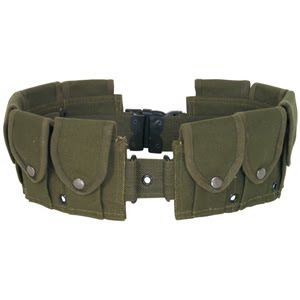
 The lap dog Fifty Caliber Institute picks up NRA turds prior to dining.
The lap dog Fifty Caliber Institute picks up NRA turds prior to dining.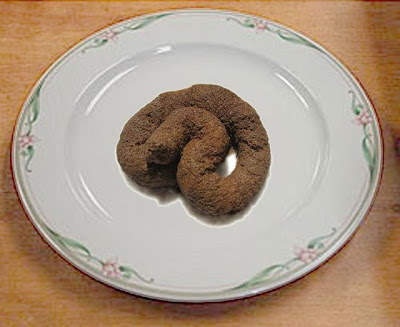 Lunchtime at the Fifty Caliber Institute. "Hey, man, can you pass the jumbo bottle of ketchup, please?
Lunchtime at the Fifty Caliber Institute. "Hey, man, can you pass the jumbo bottle of ketchup, please?
"When democracy becomes tyranny, I STILL get to vote."
 A new addition to the Three Percent Creed: No free stolen elections.
A new addition to the Three Percent Creed: No free stolen elections."Stroke of the pen. Law of the land. Kinda cool." -- Clinton advisor Paul Begala.
Dear President Obama:
We understand that there’s a push for your Administration to develop a plan to unilaterally extend either deferred action or parole to millions of illegal aliens in the United States. We understand that the Administration may include aliens who have willfully overstayed their visas or filed for benefits knowing that they will not be eligible for a status for years to come. We understand that deferred action and parole are discretionary actions reserved for individual cases that present unusual, emergent or humanitarian circumstances. Deferred action and parole were not intended to be used to confer a status or offer protection to large groups of illegal aliens, even if the agency claims that they look at each case on a “case-by-case” basis.
While we agree our immigration laws need to be fixed, we are deeply concerned about the potential expansion of deferred action or parole for a large illegal alien population. While deferred action and parole are Executive Branch authorities, they should not be used to circumvent Congress’ constitutional authority to legislate immigration policy, particularly as it relates to the illegal population in the United States.
The Administration would be wise to abandon any plans for deferred action or parole for the illegal population. Such a move would further erode the American public’s confidence in the federal government and its commitment to securing the borders and enforcing the laws already on the books.
We would appreciate receiving a commitment that the Administration has no plans to use either authority to change the current position of a large group of illegal aliens already in the United States, and ask that you respond to us about this matter as soon as possible.
I might not have made it if it hadn't been for Pappy. Already a Special Forces soldier, Stefan "Pappy" Mazak joined our class to continue his training, which is required of a Green Beret. Pappy was a Czechoslovakian who had entered the Special Forces at a time when many of the Green Berets were foreigners. He had been a French resistance fighter in World War II, and as a Special Forces member was well known for his gallantry.
One of the military stories about Mazak concerned his actions in the Belgian Congo. A surge of violence swept over this huge expanse of land, and most of it was directed against the white settlers, many of them American. Pappy was chosen from among the ranks of the Special Forces to help those settlers in remore areas who were without any security.
Lieutenant Frank Fontaine led a team that was attempting to rescue a priest and twelve refugees, of which six were nuns. To reach them, Fontaine's men walked to a village near an airstrip in Gwendje. The refugees' condition was shocking; the nuns had been brutally raped and were in desperate need of medical attention. Fointaine reached Mazak by portable radio and told him to locate a platoon of Belgian paratroopers and get to Gwendje fast.
As Fontaine approached the field, he was surrounded by a screaming band of about fifty threatening, gun-toting rebels. He singled out the most likely leader, and invited him outside the circle for a private conversation. The self-styled leader informed Fontaine that "all whites were to die."
Fontaine produced a grenade, pulled the pin, and (held it out) to the leader. "Okay, boss, shoot me. I will die but we will die together." For two hours the stare-down continued, with Fontaine acutely aware that he could not hold the grenade firing lever forever.
Mazak had been notified by the circling planes about the situation on the ground, and he instructed his pilot to make an emergency bush landing outside the sight line of landing strip. On the ground, Mazak emerged from the bush holding two submachine guns.
Across the runway ran Mazak, all five feet two inches and one hundred and eighty pounds of charging rhinoceros. He fired wildly into the air as he screamed French Legionnaire profanities at the top of his lungs. Fontaine saw the fear in the eyes of his chief opponent and tossed the grenade into the midst of his captors.
The remaining live rebels ran screaming into the bush, abandoning not only the refugees but their arms as well. Within minutes the refugees were airborne and headed for safety. Later the normally subdued Mazak apologized to Fontaine for his outburst of theatrics, but stated, "I just couldn't think of anything else to do at that moment."
When Fontaine asked Mazak about the Belgian paratroopers he had requested, Mazak stated that he couldn't wait for the slowpokes to effect the rescue, that he knew that he was the only one available at the time.
As our instructor relayed the details of Mazak's action in class that day, my eyes became fixed on Mazak. A man shorter in stature than even I. I observed his humility as the story, all of us in the room rose to attention almost simultaneously without being ordered. Our instructor offered Pappy the greatest compliment he could muster when he said, "Detail face Sergeant Mazak. Present arms! Order arms!"
Our instructor asked Mazak if he would honor the group with some comments or reflections. It was extremely difficult to coax him to his feet, but we all insisted that we wanted him to speak. He slowly rose, and every eye in the room was glued to him. Pappy apologized profusely about his poor English and made it clear that he was a man of few words. What words they were! I shall never forget them.
Pappy reflected: "We in this room are all men who believe that actions speak louder then words. If I can impart anything from my life as a soldier it is this: There are only two types of warrior in this world. Those that serve tyrants and those that serve free men. I have chosen to serve free men, and if we as warriors serve free men, we must love freedom more than we love our own lives. It is a simple philosophy but one that has served me well in life."
At that moment I was drawn to this aging gladiator like metal to a magnet. Here was a man that I could identify with, and here was a man that I could learn from.
Since Pappy didn't speak English very well, studying was hard for him. I approached him and suggested that we pair up as study partners, and he liked the idea. My own lack of formal education made us a perfect team. We struggled, but we made it through. -- Master Sergeant Roy P. Benavidez, Unites States Army Special Forces (Retired), in Medal of Honor: One Man's Journey from Poverty and Prejudice.

"First they came for the Communists, but I was not a Communist so I did not speak out. Then they came for the socialists and the Trade Unionists, but I was neither, so I did not speak out. Then they came for the Jews, but I was not a Jew so I did not speak out. And when they came for me, there was no one left to speak out for me."
— Pastor Martin Niemoller, German Pastor, 1945.
-----Original Message-----
From: REDACTED
To: GeorgeMason1776@aol.com; REDACTED; REDACTED
Sent: Wed, Jun 23, 2010 12:59 am
Subject: Where Does McChrystal Go Now?
I am sure there are others like McChrystal, and some of them will be ejected right along with him.
What do you all think about trying to get that kind of talent on our team in the near future?
"First, I pissed off the Constitutionalists, but I had plenty of friends and my poll numbers were through the roof, so I didn't mind. Then, I pissed off the Christians, and I had plenty of friends, so I didn't mind. Then I pissed off the Jews about Israel, and I had plenty of other friends, so I didn't mind. Then I pissed off the free marketers, the property rights advocates and Jon Voight, but I still had plenty of friends, so I still didn't mind. (Besides, I thought, Jon Voight can't get a job in Hollywood any more, so what use is he?) Then I pissed off the entire military over 'Don't ask, don't tell,' and finally the special operators about McChrystal, but I still didn't mind because I thought I still had enough friends. Then I looked around, and I realized that while I still had plenty of friends, none of them had guns, and all the guns in the room were pointing in my direction. THAT I minded. Of course, The ATF still obeyed me, but what use are they, the incompetent dicks?"

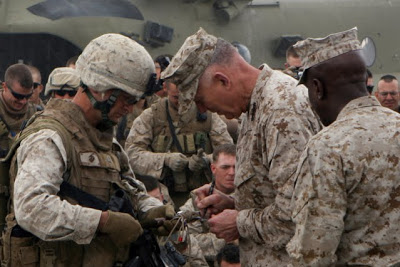
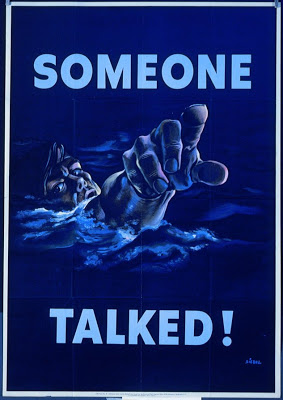
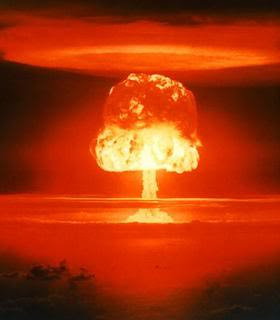
Here's What Oil Industry Insiders Are Gossiping About The Oil Spill
The Mad Hedge Fund Trader
Jun. 21, 2010, 4:13 PM
Over the years, I have invested so much time wildcatting in the oil patch that I will never be wanting for great steaks at Nick & Sam's in Dallas, skyboxes at Cowboys games, and personally signed 8 X 10 glossy photographs of George W. Bush. So to get the skinny on the BP mess, I spent the weekend catching up with old friends who live with a permanent oil stain under their fingernails.
Some of the chatter that came back was amazing. BP has discovered the largest and most powerful well in history, and control of it may be outside existing technology. The previous record gusher was Union Oil Co.'s Lakeview well in Maricopa, California, which spewed out a staggering 100,000 barrels a day at its peak in 1910, and created an enormous oil lake in the central part of the state. Estimates for the BP well now range up to 50% more than that. The pressures at 18,000 feet are so enormous, that drilling two more relief wells might only result in creating two more oil spills.
If Obama doesn't want to take the nuclear option, (click here for my piece), then there will be no other alternative but for the spill to continue until the field exhausts itself or becomes capable, possibly some time next year. This is not the end of the world. Less than 1% of the spilled oil is ending up on the beaches. Watch TV, and that is not 150,000 barrels on the beach in Pensacola, Florida. Most of the crude is being moved parallel to the coast by the current and will eventually end up in the mid-Atlantic, where it will break down or dissipate. Using the high end estimates, and assuming that it takes a year to run out, possibly 36 million barrels will end up in the sea (pressure is declining).
This is the same amount of oil that was dumped into the Atlantic during WWII, when 452 tankers were sunk by German U-boats, mostly along the US east coast, and when tar on the beach was a daily occurrence. This is on top of the 1.5 million barrels a year that leak into the Gulf through natural seepage, which no one ever notices. One way or the other, this will end, and Western civilization will survive. And by the way, the crude price rise brought by the spill also marked up the value of BP's reserves, easily allowing it to cover the cost of the clean up, no matter how big it is.
This is how profitable this company is, and why they were so generous with a $20 billion contingency fund. For a fascinating peak on how BP's management initially responded to the Gulf oil spill, watch this video taken by a secret camera inside their board room, which I obtained from a confidential source on pain of death. Brace yourself. And you wonder how it got so bad. Here's how,
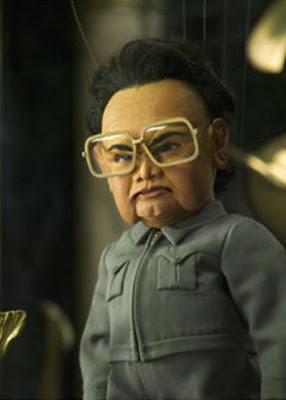 Kim Jong Il, star of the movie "Team America."
Kim Jong Il, star of the movie "Team America."The Juche Idea (Korean pronunciation: [tɕutɕʰe] approximately "joo-cheh") is the official state ideology of North Korea. It teaches that "man is the master of everything and decides everything," and that the Korean people are the masters of Korea's revolution. Juche is a component of Kimilsungism, North Korea's political system. The word literally means "main body" or "subject"; it has also been translated in North Korean sources as "independent stand" and the "spirit of self-reliance". -- Wikipedia.
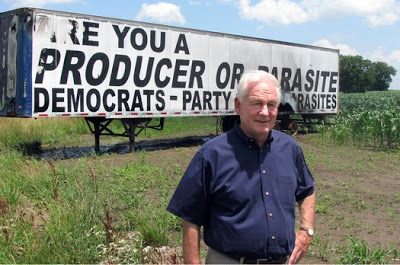
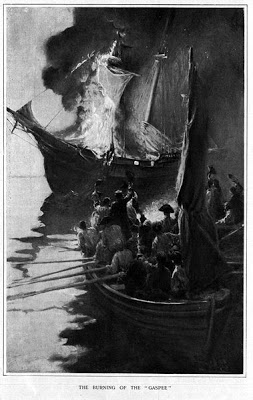 The burning of the Gaspee.
The burning of the Gaspee.. . .here is the formula of the Founders with a dollop of Michael Collins and a Twenty-First Century 4th Generation Warfare twist:
Government oppression is met by passive resistance, a refusal to obey. This refusal makes the tyrants initially irritated and eventually crazy enough to escalate to the next level — you WILL do what we say or we will kill YOU. Then we continue until they do. After they cross the line, we respond by evading the arms, legs and sinews of their tyrannical beast, and striking directly at the heart, eyes and brains of the monster.
This way requires stoic patience. It requires brilliant planning. It requires trained competence at the art and science of war. It requires the tools to execute all of those things. And most importantly, it requires the moral purpose and indomitable will to bring it about.
The Gaspée Affair was a significant event in the lead-up to the American Revolution. HMS Gaspée, a British revenue schooner that had been enforcing unpopular trade regulations, ran aground in shallow water on June 9, 1772, near what is now known as Gaspee Point in the city of Warwick, Rhode Island, while chasing the packet boat Hannah. In a notorious act of defiance, American patriots led by Abraham Whipple and John Brown, attacked, boarded, looted, and torched the ship.
Background
The customs service in Britain’s North American colonies in the eighteenth-century had a violent history. The Treasury in London did little to correct known problems and Britain itself was at war during much of this period and was not in a strategic position to risk antagonizing its overseas colonies. At the end of the Seven Years' War, following Britain’s decisive victory, several successive ministries implemented reforms in an attempt to achieve more effective administrative control and raise more revenue in the colonies. The revenue was necessary, Parliament believed, to bolster military and naval defensive positions along the borders of their far-flung empire, and to pay the crushing debt incurred in winning the war on behalf of those colonies. Among these reforms was the deputizing of the Royal Navy's Sea Officers to help enforce customs laws in colonial ports. In 1764 Rhode Islanders attacked HMS St. John and in 1769 they burned a customs ship, HMS Liberty, on Goat Island in Newport harbor.
The incident
In early 1772, Lieutenant William Dudingston sailed HMS Gaspée into Rhode Island’s Narragansett Bay to aid in the enforcement of customs collection and inspection of cargo. Rhode Island had a reputation for smuggling and trading with the enemy during wartime. Dudingston and his officers quickly antagonized powerful merchant interests in the small colony. On June 9, the Gaspée gave chase to the packet boat Hannah, and ran aground in shallow water on the northwestern side of the bay. Her crew was unable to free her immediately, but the rising tide might have allowed the ship to free herself. A band of Providence members of the Sons of Liberty rowed out to confront the ship's crew before this could happen.
At the break of dawn on June 10, they boarded the ship. The crew put up a feeble resistance, Lieutenant Dudingston was shot and wounded, and the vessel burned to the waterline. The man who fired the shot was Joseph Bucklin:
"JOSEPH BUCKLIN, was well known in Providence and kept a prominent restaurant, or place of resort, in South Main Street, where gentlemen resorted for their suppers. Here, too, they assembled, to discuss politics, and where, possibly, the expedition which destroyed the Gaspee, was discussed, as well as at Mr. Sabin's house, which was near it."
Aftermath
Previous attacks by the colonials on British naval vessels had gone unpunished. In one case, a customs yacht was actually destroyed (also by fire) with no administrative response. But in 1772, the Admiralty would not ignore the destruction of one of its military vessels on station.
The American Department consulted the Solicitor and Attorney Generals, who investigated and advised the Privy Council on the legal and constitutional options available. The Crown turned to a centuries-old institution of investigation, the Royal Commission of Inquiry. This commission would be made up of the chiefs of the supreme courts of Massachusetts, New York, and New Jersey, the judge of the vice-admiralty of Boston, and the governor of Rhode Island, Joseph Wanton. The Dockyard Act, passed three months earlier in April, allowed those suspected of burning His Majesty's vessels to be tried in England. But this was not the law that would be used against the Gaspée raiders; they would be charged with treason. The task of the commission was to determine against which colonists there was sufficient evidence for their trial in England. The Commission was unable to obtain sufficient evidence and declared their inability to deal with the case.
Colonial Whigs were alarmed at the prospect of Americans being sent to England for trial. A Committee of Correspondence was formed in Boston to consult on the crisis. In Virginia, the House of Burgesses was so alarmed that they also formed an inter-colonial committee of correspondence to consult in the crisis with other committees.
In Boston, a little-known visiting minister, John Allen, preached a sermon at the Second Baptist Church that utilized the Gaspée affair to warn listeners about greedy monarchs, corrupt judges and conspiracies at high levels in the London government. This sermon was printed seven different times in four colonial cities, becoming one of the most popular pamphlets of Colonial British America. This pamphlet, along with the incendiary rhetoric of numerous colonial newspaper editors, awoke colonial Whigs from a lull of inactivity in 1772, thus inaugurating a series of conflicts that would culminate in the Battles of Lexington and Concord. -- Wikipedia.
"Rebellion to tyrants is obedience to God." -- Motto proposed for the Great Seal of the United States by Thomas Jefferson and Benjamin Franklin
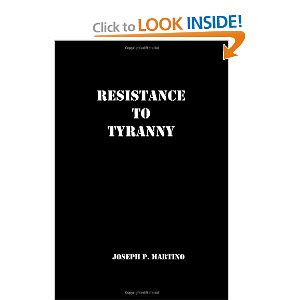
According to Freedom Houses (www.freedomhouse.org), of 194 nations in the world, 47, with total population of 2.3 billion people, are "not free." Residents of those countries (one hesitates to call them "citizens") lack political freedom and civil rights. The oppressive governments in some or all of those countries deserve to be overthrown; peacefully if possible, by force if necessary.
If you live in such a country, and you're reading this book, I assume you're already thinking about the possibility of armed resistance to an oppressive government. This book is intended as a primer, not as a handbook or an encyclopedia. A handbook tells you what you realized you didn't know. It answers questions you knew enough to ask. This book is a primer. It's intended to introduce you to what you might now realize you don't know, and therefore wouldn't think to ask. It provides a basic introduction to each topic, then identifies resources which can provide you with additional information.
Most of the material will be presented in terms of general principles. To make the application of the principles more concrete, specific illustrations will be used. Many of these specific illustrations will be drawn from past revolutions. However, readers will need to adapt them to conditions in their own countries, or to their own circumstances. Readers must not allow the illustrations to mislead them into thinking the principles would apply only to the specific cases used as illustration. The principles apply everywhere; the application must take concrete circumstances into account.
As will become apparent to the reader, there is an enormous amount of information available on various aspects of armed resistance. Even the Additional Reading lists at the ends of the chapters only scratch the surface. While this book is intended for information purposes only, information should eventually lead to action when action is justified. Readers must not allow themselves to be trapped in an information-gathering mode, seeking to learn ever more about ever-finer aspects of the topic. If armed resistance is justified, there comes a time when one must close the book and act.
That's interesting, Joe. You might share with us some of your qualifications to write such a book.
A fair question.
I'm a retired Air Force colonel. I wasn't a flyer. I spent all my time in research & development. After I finished my PhD in Statistics, I was immediately assigned to the R&D Field Unit in Bangkok, where I spent the next couple of years doing operations research on the insurgencies in Thailand and Vietnam. After my return to the States, I spent the next five years as Chairman of the Special Warfare Working Group of the Military Operations Research Society.
That was the end of my "official" involvement with insurgency, rebellion, etc., but I continued to pursue the topic on my own. I published articles in a number of places, including what was then the AIR UNIVERSITY REVIEW, and I gave several papers at the regular Vietnam Symposia held at U. Texas at Lubbock, home of one of the biggest Vietnam archives in the world.
In the '90s I put the issue of insurgency aside and wrote a book applying Just War Doctrine to the use of nuclear weapons. It's now out of print, and with the demise of the Soviet Union, out of date as well.
By the late 1990s I came to realize that insurgency was becoming a more important topic than nuclear weapons, so I went back to my earlier interest. I thought I saw a need for a book that addressed the topic from the "other side," that is, from the insurgents' side, not from the side of the counterinsurgent, which had been my previous focus. I figured there were lots of places in the world where an insurgency would be justified, and such a book might be helpful.
I probably should add that I have never fired a shot in anger (although I came close the night I awoke to find an intruder in my bedroom). I've done a lot of research on what other people have experienced in carrying out revolutions, and tried to summarize their experience in my book. I hope the summary will be useful to those who need it.
In summary, then, tyranny is the reason for armed resistance. Tyranny is deadlier than war, because it consists of an armed government making war on its own unarmed citizens. People don't have to submit to tyranny. On the contrary, they have a moral obligation to resist. There are guidelines that people can use to help determine when tyranny has reached the point at which resistance is justified. The most important consideration, however, is that tyranny must be stopped early, even at a high price, because if allowed to continue it will exact an even higher price. In particular, tyranny must be stopped while the means to stop it are still available to the population. To wait until a government removes the means of resistance is in effect to surrender to that tyranny.
TABLE OF CONTENTS
Preface i
Chapter 1 Why Armed Resistance 1
Chapter 2 Probability of Success 30
Chapter 3 Government Response 57
Chapter 4 Strategy and Tactics 79
Chapter 5 The Big Picture 89
Chapter 6 Overt and Covert Resistance 95
Chapter 7 Personal Weapons 106
Chapter 8 Personal Equipment 115
Chapter 9 Survival Skills 130
Chapter 10 Land Navigation 137
Chapter 11Camouflage & Concealment 155
Chapter 12 Boobytraps 159
Chapter 13 Weapons Caching 163
Chapter 14 Logistics 172
Chapter 15 Training 189
Chapter 16 Secure Camps 213
Chapter 17 Safe Houses and Secure Areas 220
Chapter 18 Communications 225
Chapter 19 Encryption and Codes 237
Chapter 20 Getting Your Story Out 252
Chapter 21 Attack and Defense 280
Chapter 22 Ambushes 295
Chapter 23 Sniping and Counter-Sniping 303
Chapter 24 Assassination 341
Chapter 25 Sabotage 354
Chapter 26 Raids 369
Chapter 27 Strategic Intelligence 381
Chapter 28 Tactical Intelligence 393
Chapter 29 Counterintelligence 413
Chapter 30 Lives, Fortunes & Sacred Honor 423
Appendix A General References 427
Appendix B Patrick Henry’s Famous Speech 429
Where to counterattack? Armed resistance against a bureaucracy seems hopeless. If a revenue agent hits you with a big fine that will bankrupt you if you pay it, and will result in a jail sentence if you don't, whom do you shoot? If a safety inspector hits you with a regulation that bankrupts your business, whom to you shoot? If an environmental protection agent denies you the use of your property on some excuse about an endangered species or a wetland, whom do you shoot? Governments have ways of oppressing you that a gun does not seem to be a ready answer for. Keep in mind, then, that the more rules the government has, the more ways it can tie you down. It is essential to get rid of a government with such powers. But the best target may not be the specific government agencies that are causing the problems. The resistance movement must go for the head, not the appendages of the "monster."